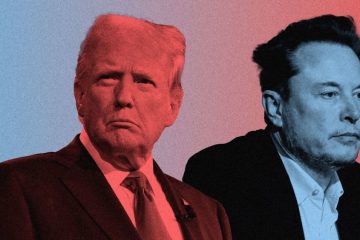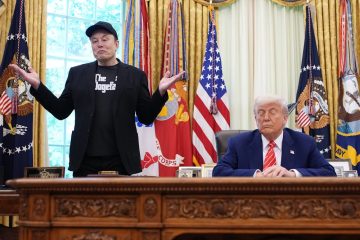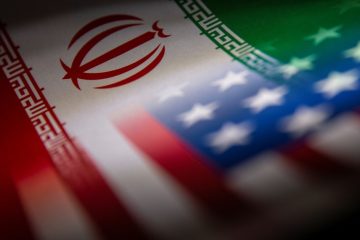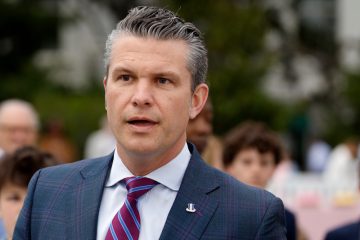Trump’s momentum has world leaders bracing for round two

Donald Trump’s free-form stump speeches bounce around the globe, ticking off problems and grievances with foreign governments. Until recently, world leaders had tuned him out.
Now they are parsing Trump’s words and making plans for the possibility he will return to the White House.
The former president is the Republican front-runner and, after a resounding win in New Hampshire’s primary on Tuesday, appears on course to secure his party’s nomination. In some opinion polls he leads President Biden in a general-election face-off.
Trump has promised mass deportations, a quick resolution of the war in Ukraine and a crackdown on imports, calling himself “a Tariff Man.” He has accused Taiwan of snatching the microchip industry from the U.S. He has also pledged tough lines on China, Iran and European countries not spending enough on defense.
Leaders in many of America’s closest allied nations fear an administration willing to ignore diplomatic norms and traditions. Some also worry that a second Trump administration would slash the U.S. security umbrella at the core of a postwar order that brought peace, democracy and rising prosperity to much of the world. Others see a potential upside in a president who has emphasized business-world pragmatism.
To prepare, foreign governments are working their Washington contacts in the hope of learning who might join Trump’s inner circle and what their policy ideas look like. Leaders are touting steps they have taken over recent years, such as increasing military spending, that they know are important to Trump. And they are bracing for a much more inward-looking U.S.
“We want to help the globe if possible,” Trump said in a campaign speech on Friday in New Hampshire. He added a caveat: “We’ve got to help ourself first. Our country is in horrible distress.”
He dismissed Nikki Haley, his sole rival for the Republican nomination, as “a globalist fool.” Haley, who served as Trump’s ambassador to the United Nations, “can be easily manipulated to obtain and send hundreds of billions of dollars to Ukraine.”
“I want to help Ukraine too,” Trump said. “The problem I have is it never should have happened.”
Trump said there was “zero chance Putin would have done it with me there,” referring to Russian President Vladimir Putin’s large-scale invasion two years ago. “I used to talk to him. I was the apple of his eye. But he was never gonna do it because I told him what we would do to them.”
Ukrainian President Volodymyr Zelensky criticized Trump’s contention that he could quickly end the war.
“It is very dangerous, what he’s saying,” Zelensky said in an interview this month with Britain’s Channel 4. The possibility that Trump would make decisions and strike a deal with Putin without consulting Ukraine “is a bit frightening,” he said.
Other leaders are avoiding comments about Trump. Australian Prime Minister Anthony Albanese’s government “will work with whatever the outcome is because the relationship between Australia and the United States is not just a relationship between individuals or leaders,” he said in an interview with Sky News Australia on Monday.
French President Emmanuel Macron, in a press conference in Paris last week, said: “I take the leaders that people give me, and I engage in dialogue with anyone in the service of France and its interests.”
Macron said he had achieved significant accomplishments with Trump as president, despite failures on issues including climate change and taxation.
Some politicians are dancing around the issue. Poland’s new foreign minister, Radoslaw Sikorski—who in his previous position as a member of the European Parliament accused Trump of harming trans-Atlantic relations—last week was asked at the World Economic Forum in Davos, Switzerland, about prospects for Trump’s return. “It is a great question which I would have answered you clearly in my previous capacity as a member of the European Parliament,” he said, chuckling. “But in my current capacity, I’ll have to tell you that Poland will work with every American president and we will want to have the best possible trans-Atlantic relations.”
Trump, in his speech Friday, took European governments to task for insufficiently supporting the North Atlantic Treaty Organization and boasted of how he compelled them to spend “billions and billions of dollars” more on defense.
“They’re not in love with me,” he said of European governments. “I got them to do things nobody thought possible.”
In Asia, U.S. allies are concerned about a possible American pullback from the region.
Biden has sought to rebuild ties that his aides say frayed under Trump. In August, Biden hosted a summit at Camp David with South Korean President Yoon Suk Yeol and Japanese Prime Minister Fumio Kishida. Under Yoon, South Korea and Japan have patched up some of their longstanding differences and agreed to cooperate alongside the U.S. in responding to North Korean provocations.
Biden has also reached deals to cooperate with South Korea on nuclear deterrence and to supply nuclear-powered submarines to Australia. And, going beyond official U.S. policy, Biden has repeatedly stated that the U.S. would help defend Taiwan if the self-ruled island democracy were invaded by China.
All of those positions could be at risk if Trump returns to office, say some in the region.
“If Trump is elected, South Korea’s relationship with the U.S. will change drastically,” said Yang Kee-ho, a professor of Japanese studies at Sungkonghoe University in Seoul. “That’s why officials have been moving quickly on cooperative measures between Washington, Tokyo and Seoul, to make the trilateral framework difficult to overturn.”
A leading concern is how Trump would respond to potential Chinese hostility toward Taiwan. Unlike Biden, he has declined to say if he would defend the island.
“I was very tough on China. I tariffed them to a level 25 and 50% everything,” he said in an interview on Fox News in July. “With that being said, Taiwan did take all of our chip business. You know, we used to make our own chips. Now they’re made in Taiwan, 90% of the chips.”
“It is possible, hypothetically, he will say, ‘Let’s finish this conflict by way of America allowing [Chinese President] Xi Jinping to claim annexation of Taiwan,’” said Haruo Shimada, a Japanese economics professor and former government adviser, at a Tokyo event Tuesday.
Shimada observed that Japan, with encouragement from the Biden administration, has agreed to nearly double its military spending, largely to counter the Chinese threat. If Trump said he was yielding to China and didn’t care about that, “I think the Japanese government would face a tremendous shock,” Shimada said.
Not all leaders are voicing concern about a potential Trump win. Polish President Andrzej Duda, a self-described conservative, said Trump is “perfectly aware” of threats from Russia, and it was he who first moved to block Russia’s Nord Stream 2 gas pipeline to Germany, which Poland long deemed a security threat. The project was halted, before coming online, two days before Russia invaded Ukraine in 2022.
“I don’t think he is naive about Vladimir Putin,” Duda said in an interview.
And many countries see a less-globalist U.S. as positive.
“We would really welcome his presidency,” said Ugandan government spokesman Ofwono Opondo on Wednesday. “During Trump’s first term, American intervention in the world was really minimal.” Trump’s campaign performance “also shows that America is not different from Africa,” Opondo said.
“Trump is someone who refused to concede an election loss. He is facing numerous criminal charges. These are the same things the Americans have accused African leaders of doing,” Opondo said. “They say African leaders have no morals, yet Americans are electing someone with such a tainted record.”









